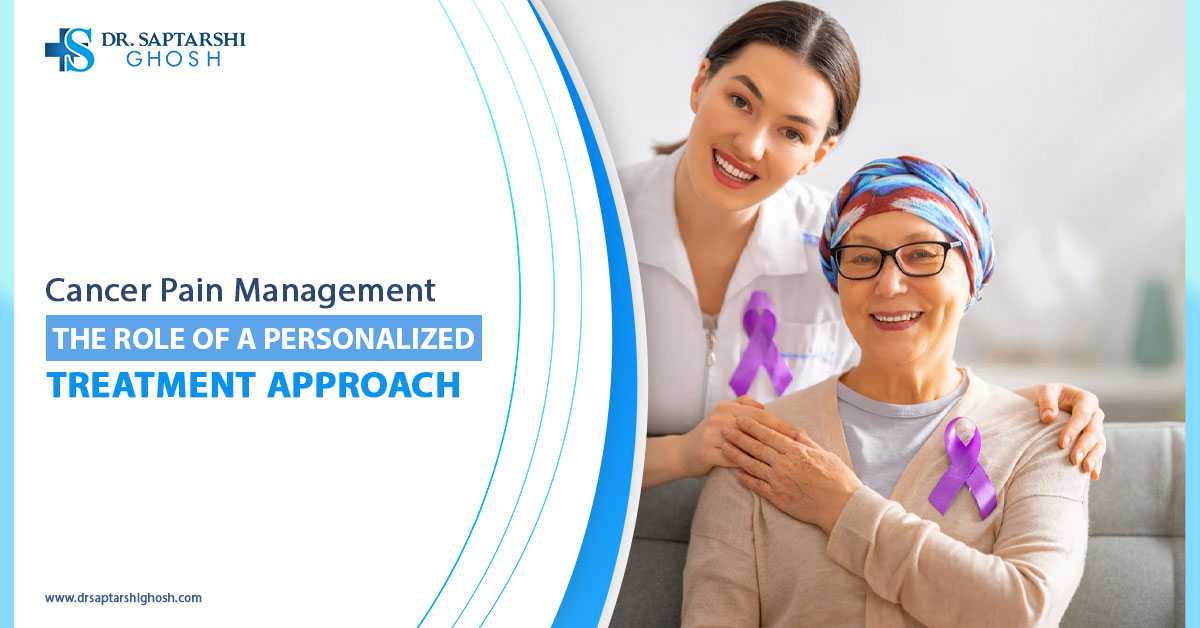The term cancer pain is not always physical. Yes, diseases like cancer can cause physical discomfort ranging from mild to intense, but pain can be psychological as well. When pain can affect daily life, treatment and management can restore your quality of life.
Surgery, intravenous chemotherapy, tumors, radiation therapy, and diagnostic tests can all induce some level of discomfort. However, such discomfort is one of the most prevalent complaints among cancer patients. Advanced medical facilities for cancer pain management in Siliguri under Dr. Saptarshi Ghosh may ensure optimal relief and health improvement.
Overview of Cancer Pain
Cancer-associated pain can result from treatment or can be a complication of cancer spread affecting bones, soft tissue, or nerves. One part of your body may experience discomfort brought on by cancer in another part of your body.
For instance, even though the liver sits behind the right ribcage, a swollen liver may result in pain in your right shoulder. This occurs as a result of the liver pressing against nerves that terminate in the shoulder.
There’s a term called phantom pain, whichmeans discomfort in an area of your body that has had a malignant tumour surgically removed. Phantom pain affects 50 to 80 out of 100 persons (50 to 80%). After a few months or after the first year, the discomfort usually subsides for most patients.
Neuropathic pain is another name for nerve pain, which is common in cancer patients. It is brought on by injury to the nerves or strain on the spinal cord, frequently characterized by a searing, shooting, tingling, or a crawling sensation beneath the skin. Pain management can help improve nerve pain and provide quality relief.
Because cancer can damage bone tissue, it can travel up to the bone and cause discomfort or pain. One or more bone regions may be affected by the cancer. Another name for bone pain is somatic pain, which is frequently described as throbbing, dull, or aching pain.
Personalized Pain Management: What Is It?
Personalized cancer pain management means developing a course of treatment according to many unique criteria, such as:
- Cancer type and grade/ stage
- Where and how intense the discomfort is
- Side effects and current therapies
- State of mind and emotions
- Personal values and way of life
- Genetic composition and drug response
A multidisciplinary team is needed for pain management strategy, which generally consists of doctors who specialize in cancer pain management. Specialists include psychologists, oncologists, palliative care experts, nurses, and even physiotherapists, and dietitians/nutritionists.
Insights into Cancer Pain Management
Here, pain management can be initiated before the start of surgery. A few medications may be used to induce sleep or promote relaxation in cancer patients. Doctors help manage treatment-related pain and anxiety related to treatment or post-treatment.
Since pain is a personal or subjective experience, thorough and continuous care is the first step. In a comprehensive assessment, a doctor may askpatients to inform about the intensity of their pain, describe it (burning, aching, stabbing), record what causes or relieves it, and monitor how it changes over time.
- Medication is still the mainstay of cancer pain treatment. Oncologists prescribe medications based on the type of pain one has. These meds may include NSAIDs or non-opioid medications. Consult the leading doctor for the best pain management treatment in Siliguri.
- ·For moderate to severe pain, doctors may prescribe opioids like oxycodone or morphine. Further, corticosteroids, antidepressants, and anticonvulsants are examples of adjuvants for pain associated with nerves.
- Customized pain management care for cancer patients modifies doses, combinations, and administration techniques (transdermal, intravenous, and oral). This is because the optimization of any treatment increases its effectiveness and reduces adverse effects.
- Physical therapy is another effective choice to increase the range of motion and decrease rigidity. Massage and acupuncture may be good pain management choices. They may help relieve tension and tense muscles.
- Another beneficial treatment here is mind-body practices, such as yoga, meditation, or guided visualization, to treat the psychological and emotional aspects of pain. Receive optimal pain management in Siliguri City from the top oncologist.
Though prevalent, cancer pain needs medical attention. Patients can find comfort after receiving individualized therapy. Oncologists provide patients with more than simply relief;they understand this discomfort is not a general symptom. Speak to your oncologist today and get expert advice on optimal cancer pain relief.





